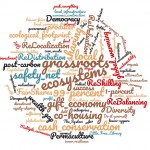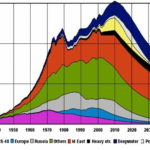The Beginning of Contraction
“Understandably, everyone wants it to get “back to normal.” But here’s a disturbing thought: What if that is not possible? What if the goalposts have been moved, the rules rewritten, the game changed?”
–Richard Heinberg
Biocapacity and the limits to economic growth are already being painfully felt in some places, while in other places people might have the luxury cushion to go on pretending it isn’t so for several more years. Right now, people in some of the affluent social circles around me continue to carry on in denial. Discussions of the issues in this booklet seem absolutely absurd to them. After all, the newspapers have said “the economy is recovering.”
Yet we can’t pretend away the indicators all around us. The fact that we are severely overextended is showing up not just in our ecological systems, but in our human ones as well.
There are no Buffett fundamentals to support the notion of “economic recovery.” In fact the very substance that should be there is hollow.
It calls to mind the times when rats get into my grapefruit tree. They bore a small hole in one side of the fruit, then crawl inside and eat all the flesh. You’re left with an empty, hollowed-out rind dangling there on the tree.
Stoneleigh points out how our current economic “growth” figures include tons of transactions which are entirely built upon credit and financial instruments. There isn’t any substance to them.
The substance that supports many of our conventional economic transactions is rapidly depleting. Peak oil promises absolutely staggering economic implications. Already we’ve seen a doubling of retail gasoline prices over the past three or so years, and the ramifications of that are still playing out across the market. Fed Ex costs more, postage costs more, moving everything around the surface of the planet costs more. Food costs a lot more. And we’re just getting started.
Peak oil will mean the end of globalization as we have known it thus far. Right now we call it “normal” to harvest raw materials on one continent, to ship them to another continent for manufacture, and to still another continent for sale. This absurd extravagance — only possible with plentiful cheap oil – is at its end. So too is the globalized economy that was built around it.
Conventional wisdom says it takes about three years for an oil shock to play out across the financial markets. Three years out from $147 a barrel in July 2008 has seen “double dip recession.” In April 2011 prices climbed back over $113 for the second time; the repercussions have yet to be seen. As oil (and now potentially coal too) becomes more precious, this volatility will only exacerbate the existing market instabilities.
Further evidence of the empty, hollowed-out rind:
Government: Our government is in dire straights: our California and Los Angeles city budgets are completely upside down, forcing them to slash programs across the board. Our national debt just reached an all-time record high. As I write this, each citizen’s share of the national debt is $47,233. The decreased tax base due to other economic factors will only exacerbate the plight of our government in coming years.
Consumers: [section being rewritten. see news reports for the 99% – Occupy Wall Street[
Labor: We have an aging population demographic, with increasing numbers of retirement-age individuals, and social security sliding into permanent deficit. We have an obesity epidemic among our youth. These signal increasing “need” for oil intense medical care, which the failing system won’t be able to supply. And this all means decreasing numbers of able-bodied adults to perform post petroleum manual labor. Who will create that “more” for this supposedly growing economy?
Social: The rate of emotional depression in the U.S. has increased more than tenfold in the last fifty years. Some thinkers declare that Western society is in the grip of a “social recession.” Our population has a psychological and spiritual sense of “maxed out.”
James Gustave Speth quotes the United Nations Development Programme’s 1996 report — which, rather than being outdated, indicates how very long our society has been desperately off track. This report lists several ways that economic performance has gone sideways:
Jobless growth – where the overall economy grows but does not expand the opportunities for employment;
Ruthless growth – where the fruits of economic growth mostly benefit the rich;
Voiceless growth – where growth in the economy has not been accompanied by an extension of democracy or empowerment;
Rootless growth – where growth causes people’s cultural identity to wither;
Futureless growth – where the present generation squanders resources needed by future generations.
Our economy is indeed that empty, hollowed-out rind dangling on the tree, without substance, without the materials for “more”.
Every market is an accumulation of human emotions. From the tulip mania of 1637 to the Dow Jones of today, mass human enthusiasm drives market values higher; mass human distrust and fear pulls economic values down. (Robert Prechter has written entire books about this.)
When we look at the emotions of a market we see where we are. We all heard the “new paradigm” a few years back when media broadcast that things would only get better. That was right before the first plunge. In denial, we now desperately search for signs of “recovery.”
To which Stoneleigh declares with bright sarcasm: “Those green shoots of recovery? That would be gangrene!”
I don’t know about you, but around me there is lots of fear. We’re in a momentary time when people desperately hope that we’re “returning to normal,” yet their guts confirm the opposite. Since I released the original version of this booklet, the stock market has tumbled yet again. It’s clear where we are on the emotions-of-a-market chart.
And we can see what lies ahead.
Early Transition materials encouraged us to “listen to the elders.” Around here, members of the generation that experienced the Depression of the 1930s have been telling us hold on to your cash. It looks just like they saw before.
The fundamental problems with the old economy
• Jerry Mander, “Barking up the Wrong Tree” — a (brutally) concise, one-page synopsis written by Jerry Mander of the International Forum on Globalization. Page 9 of this pdf: www.postcarbon.org/report/44377-searching-for-a-miracle
• Stoneleigh/Nicole Foss, “Century of Challenges” DVD http://theautomaticearth.blogspot.com/
• Stoneleigh/Nicole Foss, “Making sense of the financial crisis in the era of Peak Oil,” chilling, fast-paced audio talk. access via www.transitionus.org/blog/our-end-economy-moment
• Heinberg, Richard, “Who Killed Economic Growth?” animated You Tube 5:47 www.youtube.com/watch?v=EQqDS9wGsxQ
• Transition United States, “Economic Crisis” www.transitionus.org/why-transition/economic-crisis


